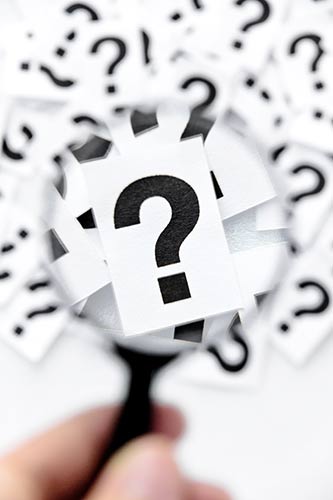
If you’re asking, “Do I qualify for disability?”, you should know there are multiple types of disability to qualify for. These include private disability income insurance, state disability coverage, and federal disability insurance. We’ll explain which types you may qualify for, and what to do next.
➡️ We recommend all our clients have their own disability policies. If people depend on your income, you need coverage! Call us at (800) 823-4852 or click the button below to request a free quote.
Request a Free QuoteJump to a section:
Do I Qualify for Disability?
Qualifying for Private Disability Income Insurance
Qualifying for State Disability Insurance
Qualifying for Federal Disability Insurance
Why Owning Your Own Disability Insurance Is a Good Idea
Do I Qualify for Disability?
Disability insurance comes in multiple forms: private, state, and federal. To figure out if you qualify, you need to decide which type you’re trying to qualify for. Here’s a quick rundown of these three types:
- Private disability income insurance. Insurance companies offer short- and long-term disability coverage to both employers and individuals. If you already have private long-term disability insurance, you’d probably know it since you’d be paying monthly or yearly premiums. You may have short-term disability coverage through work, however, and not even realize it. Check with your HR representative and ask if you have any coverage in place.
- State-mandated disability insurance. Six states and one territory have state-mandated short-term disability coverage available to qualified state residents. These are California, Hawaii, New Jersey, New York, Rhode Island, and Puerto Rico. If you live in Puerto Rico or one of these states, you’ve been paying into these programs through your paycheck’s taxes, even if you didn’t realize it. If you’ve worked at least the minimum number of required hours for your state, you qualify to apply for benefits from this short-term state coverage.
- Federal disability insurance. This is what most people are looking for when they look up, “Do I qualify for disability?” The federal program is run through the Social Security Administration and is available to qualified workers who have paid the minimum required amount into the system through payroll taxes. It focuses exclusively on long-term disability (disabilities lasting longer than 12 months). Federal disability insurance does not cover short-term disabilities.

➡️ We recommend all our clients have their own disability policies. If people depend on your income, you need coverage! Call us at (800) 823-4852 or click the button below to request a free quote.
Request a Free QuoteQualifying for Private Disability Income Insurance
Private disability insurance is the easiest to qualify for – except for the fact that you have to have it in place before you experience a qualifying disability. Most common illnesses and injuries are covered. The exceptions are usually pre-existing conditions, which would be noted in your policy documents. Other exceptions include injuries or illnesses that occurred while fighting in a war or committing a crime. Your policy documents will give you complete information on covered conditions; every insurer sets their own criteria and list of covered disabilities.

Short-term disability policies usually have a very short waiting period (1-14 days), which means you can start collecting benefits soon after you’re disabled.
To qualify: You need to have a doctor’s sign-off that you cannot work for the minimum amount of time required by your policy (usually at least 2 weeks). Submit your claim as soon as you have your doctor’s sign-off. Processing is usually complete within two weeks; as long as you’ve passed the policy’s waiting period, you would then start receiving weekly payments for the length of your policy’s benefit period.
Long-term disability policies have a longer waiting period of 1-4 months, intended to make sure your disability will last at least one year (the traditional cut-off for a long-term vs. short-term disability).
To qualify: You need to have a disability that your doctor agrees will keep you out of work for at least 12 months. Submit your claim as soon as you have your doctor’s sign-off. Once your insurer verifies your condition with both your doctor and your employer, you can start receiving benefits for the length of your policy’s benefit period.
We recommend all our clients have their own disability policies. That way, instead of asking “do I qualify for disability,” you would know you have a way to protect your paycheck.
➡️ If people depend on your income, you need coverage! Call us at (800) 823-4852 or click the button below to request a free quote.
Request a Free QuoteQualifying for State Disability Insurance
If you live in Puerto Rico or one of the few states offering short-term disability coverage, you must qualify by:
- Earning enough pay in a recent time period (usually the previous calendar year)
- Experiencing a qualified illness, injury, pregnancy, or childbirth
Each state sets its own rules, so if you’re asking, “do I qualify for disability in my state,” you’ll need to look up the specific information provided by your state/territory. Every state requires you to be under a doctor’s care so that your condition can be verified.
- California: Employment Development Department. You must be employed at the time you experienced your disability, and be unable to work for at least 8 days. You must also have earned at least $300 during the calendar year previous to your disability.
- Hawaii: Disability Compensation Division. You must be currently employed at the time you experienced your disability. You must have at least 14 weeks of employment in Hawaii with 20+ hours worked each of those weeks; those weeks do not need to be consecutive or with the same employer. Additionally, you must have earned at least $400 in the 52 weeks before the first day of your disability.
- New Jersey: Division of Temporary Disability and Family Leave Insurance. You must have worked 20 weeks out of the last 4 quarters prior to experiencing your disability, and you must have earned at least $260 during those weeks, or have earned a total of $13,000 during that same time frame.
- New York: Workers’ Compensation Board. You qualify four weeks after you have been employed for 30 days. If you are currently unemployed but have been so for less than four weeks, your benefits will be paid by your last employer’s insurance carrier. You cannot collect unemployment or paid family leave at the same time as you collect for disability.
- Rhode Island: Department of Labor and Training. As of 2023, you must have earned at least $15,600 in your base period (4 of the last 5 completed calendar quarters before the date of your claim). If you don’t have enough earnings in that base period, the state can also use the last 4 completed calendar quarters before the date of your claim.
- Puerto Rico: Departamento del Trabajo y Recursos Humanos - SINOT. You must have earned at least $150 during the first 4 of the last 5 calendar quarters prior to the first day of your disability.

➡️ We recommend all our clients have their own disability policies. If people depend on your income, you need coverage! Call us at (800) 823-4852 or click the button below to request a free quote.
Request a Free QuoteQualifying for Federal Disability Insurance
The federal government’s disability program is called Social Security Disability Insurance (SSDI). This program pays benefits for long-term disabilities if you’ve paid enough Social Security taxes to meet their minimum qualifications. There is a 5-month waiting period, but if your claim is approved, you can start to receive benefits during the sixth month after you first became disabled.
Do I qualify for disability? In the case of SSDI, you must:
- Have a medical condition that will last at least one year or is expected to result in your death. This program is not intended to cover short-term disabilities, including pregnancy or childbirth. Your doctor must be willing to sign off on the fact that you are expected to be unable to work for at least 12 months.
- Have a medical condition that meets the Social Security Administration’s definition of disability. The SSA has strict definitions and documentation requirements. The program only pays for “total disability” – if you can be retrained to work in a different field, for example, that’s not considered a total disability. You can only qualify for benefits if you cannot do work in your previous field or a new field because of your condition. The ability to do work is measured by whether you can sit, lift, stand, walk, and remember. If you are unable to do some or all of those things, you may qualify. Click here for the Social Security Administration’s list of impairments they consider serious enough to keep you from gainful employment.
- Have earned the required number of work credits for your age. In most cases, you need to have earned 40 credits, 20 of which must be earned in the 10 years preceding your disability. As of 2023, you earn one credit for every $1,650 you earned in wages. You can earn a total of 4 credits every year. In other words, if you’ve earned $6,560 in one calendar year, you’ve earned the max amount of credits you can for the year. This PDF explains more about how you earn credits toward SSDI. https://www.ssa.gov/pubs/EN-05-10072.pdf

The Social Security Administration’s website has the forms you’ll need to fill out to submit a claim.
➡️ We recommend all our clients have their own disability policies. If people depend on your income, you need coverage! Call us at (800) 823-4852 or click the button below to request a free quote.
Request a Free QuoteWhy Owning Your Own Disability Insurance Is a Good Idea
State programs are meant to be temporary. And government programs have exacting rules on just how disabled you must be to qualify (full disability only, no partial disabilities covered). Plus, the federal program requires you to be retrained for new work, if possible, and follow a doctor’s treatment plan to the letter. That’s a lot to worry about while you’re trying to recover!

Private disability insurance, on the other hand, covers you when you can no longer work in your own field, period. There are no retraining requirements. Plus, the claims process is faster and easier, with fewer rejections. In fact, 3 out of 5 applications are denied. Appeals have only a 48% success rate.* Those are not good odds.
➡️ If people depend on your paycheck for food and shelter, we recommend owning your own disability insurance. Don’t risk their future when it’s easy to protect them – and yourself.
Call us at (800) 823-4852 or click the button below to request a free quote!
Request a Free Quote*SSA.gov, Fiscal Year 2022 Workload Data
